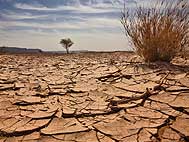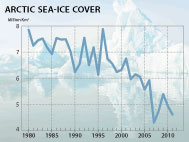| SEARCH |
-

Nov 17, 2015
Reflections on a three-decade legacy
The International Geosphere-Biosphere Programme (IGBP) will come to a close at t...
-
Nov 17, 2015
Use of and access to content on this website
Text and images produced by IGBP in house are free to use with appropriate credi...
-
Nov 12, 2015
Bella Gaia performance and panel discussion to mark IGBP's closure
A musical performance by Bella Gaia will celebrate the achievements and legacy o...
-

Towards Future Earth:
evolution or revolution?
During its three decades of existence, the International Geosphere-Biosphere Pro...
-
A personal note on IGBP and the social sciences
Humans are an integral component of the Earth system as conceptualised by IGBP. João Morais recalls key milestones in IGBP’s engagement with the social sciences and offers some words of advice for Future Earth.
-
IGBP and Earth observation:
a co-evolution
The iconic images of Earth beamed back by the earliest spacecraft helped to galvanise interest in our planet’s environment. The subsequent evolution and development of satellites for Earth observation has been intricately linked with that of IGBP and other global-change research programmes, write Jack Kaye and Cat Downy .
-
Deltas at risk
Around 500 million people worldwide live on deltas, but many of the world's deltas are sinking due ...
-
Climate change: the state of the science
A new data visualization released on the first day of the plenary negotiations at the UNFCCC’s clima...
-
Climate Change:
the State of the Science
Videos now online from the Stockholm public forum to mark the launch of the IPCC's climate report, 2...

00.01 hrs Thursday 14 November 2013
Ocean acidifcation summary for policymakers published
Mr. Terry Collins
+1 416 878 8712
tc@tca.tc
Mr. Owen Gaffney
+46 8 673 9556
+46 73 020 8418
owen.gaffney@igbp.kva.se
Ms. Anne Kathrin Raab
+44 792 160 9742
+49 228 815 0616
raab@ihdp.unu.edu
Ocean acidification may increase 170% this century with substantial costs expected from coral reef loss and declines in shellfisheries. Cold water corals also at risk.
In a major new international report, experts conclude that the acidity of the world’s ocean may increase by around 170% by the end of the century bringing significant economic losses. People who rely on the ocean’s ecosystem services – often in developing countries - are especially vulnerable.
A group of experts have agreed on ‘levels of confidence’ in relation to ocean acidification statements summarising the state of knowledge. The summary was led by the International Geosphere-Biosphere Programme and results from the world’s largest gathering of experts on ocean acidification ever convened. The Third Symposium on the Ocean in a High CO2 World was held in Monterey, California (September 2012), and attended by 540 experts from 37 countries. The summary will be launched at the UNFCCC climate negotiations in Warsaw, 18 November, for the benefit of policymakers.
Experts conclude that marine ecosystems and biodiversity are likely to change as a result of ocean acidification, with far-reaching consequences for society. Economic losses from declines in shellfish aquaculture and the degradation of tropical coral reefs may be substantial owing to the sensitivity of molluscs and corals to ocean acidification.
One of the lead authors of the summary, and chair of the symposium, Ulf Riebesell of GEOMAR Helmholtz Centre for Ocean Research Kiel said: “What we can now say with high levels of confidence about ocean acidification sends a clear message. Globally we have to be prepared for significant economic and ecosystem service losses. But we also know that reducing the rate of carbon dioxide emissions will slow acidification. That has to be the major message for the COP19 meeting.”
One outcome emphasised by experts is that if society continues on the current high emissions trajectory, cold water coral reefs, located in the deep sea, may be unsustainable and tropical coral reef erosion is likely to outpace reef building this century. However, significant emissions reductions to meet the two-degree target by 2100 could ensure that half of surface waters presently occupied by tropical coral reefs remain favourable for their growth.
Author Wendy Broadgate, Deputy Director at the International Geosphere-Biosphere Programme, said: “Emissions reductions may protect some reefs and marine organisms but we know that the ocean is subject to many other stresses such as warming, deoxygenation, pollution and overfishing. Warming and deoxygenation are also caused by rising carbon dioxide emissions, underlining the importance of reducing fossil fuel emissions. Reducing other stressors such as pollution and overfishing, and the introduction of large scale marine protected areas, may help build some resilience to ocean acidification.”
The summary for policymakers makes 21 statements about ocean acidification with a range of confidence levels from “very high” to “low”.
These include:
Very high confidence
- Ocean acidification is caused by carbon dioxide emissions from human activity to the atmosphere that end up in the ocean.
- The capacity of the ocean to act as a carbon sink decreases as it acidifies
- Reducing carbon dioxide emissions will slow the progress of ocean acidification.
- Anthropogenic ocean acidification is currently in progress and is measurable
- The legacy of historical fossil fuel emissions on ocean acidification will be felt for centuries.
High confidence
- If carbon dioxide emissions continue on the current trajectory, coral reef erosion is likely to outpace reef building some time this century.
- Cold-water coral communities are at risk and may be unsustainable.
- Molluscs (such as mussels, oysters and pteropods) are one of the groups most sensitive to ocean acidification.
- The varied responses of species to ocean acidification and other stressors are likely to lead to changes in marine ecosystems, but the extent of the impact is difficult to predict.
- Multiple stressors compound the effects of ocean acidification.
Medium confidence
- Negative socio-economic impacts on coral reefs are expected, but the scale of the costs is uncertain.
- Declines in shellfisheries will lead to economic losses, but the extent of the losses is uncertain.
- Ocean acidification may have some direct effects on fish behaviour and physiology.
- The shells of marine snails known as pteropods, an important link in the marine food web, are already dissolving.
The summary for policymakers is published by the International Geosphere Biosphere Programme, one of the sponsors of the symposium which was organised by the Scientific Committee on Oceanic Research, IGBP and the Intergovernmental Oceanographic Commission of UNESCO. The summary will be presented during an event at the UNFCCC COP-19 next week.


Notes
A copy of the summary including infographics is available at: http://www.igbp.net/publications/summariesforpolicymakers/summariesforpolicymakers/oceanacidificationsummaryforpolicymakers2013.html
Interviews with the lead authors are available on request
International Geosphere-Biosphere Programme
IGBP provides essential international scientific leadership and knowledge of the Earth system to help guide society onto a sustainable pathway during rapid global change.
For further information please contact:
Sophie Hulme
sophie@communicationsinc.co.uk, tel: +44 7973712869
Charlotte Smith
charlotte@communicationsinc.co.uk, tel:+44 7790222307
Patricia Roy
patricia@communicationsinc.co.uk, tel: +34696905907


IGBP closed at the end of 2015. This website is no longer updated.
-

Global Change Magazine No. 84
This final issue of the magazine takes stock of IGBP’s scientific and institutional accomplishments as well as its contributions to policy and capacity building. It features interviews of several past...
-

Global Change Magazine No. 83
This issue features a special section on carbon. You can read about peak greenhouse-gas emissions in China, the mitigation of black carbon emissions and the effect of the 2010-2011 La Niña event on gl...
-
INTERGOVERNMENTAL PANEL ON CLIMATE CHANGE:
How green is my future?
UN panel foresees big growth in renewable energy, but policies will dictate just how big.
-
UK:
'The Anthropocene: a new epoch of geological time?'
Royal Society, Philosphical Transactions A




















